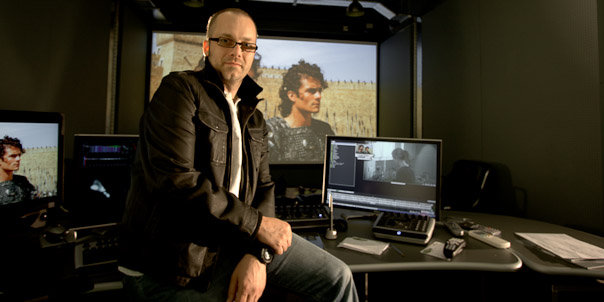ASK & DISCUSS
INDEXWhat does it take to be a professional screenwriter?
12 years, 2 months ago - Charles Harris
What comes first, the professionalism or the cheque?
To be professional means an attitude of thoroughness, of deep knowledge of our craft. Knowing our craft won't make us automatically into geniuses. But not knowing it will make it well nigh impossible.
However what I see in this country is a cult of amateurism. Perhaps Robert McKee is to blame (isn't he always?) for saying (in "Story") that on the one hand there are people who write by the rules of the craft and on the other there are geniuses. Who wouldn't want to be a genius?
So a generation of writers (and producers and directors) has grown up who believe that it's one or the other. The fact that they don't know or care about the craft proves that they must be geniuses. If only!
Sadly, the result can be seen every week in a regular flow of semi-watchable British movies (and TV). Poor plotting, poor dialogue and most daminingly poor audience engagement. Worse, these writers then appear on panels telling us how we don't need to know such things to be successful.
The truth is the reverse. Geniuses know their craft more profoundly than anyone else. Picasso was one of the greatest draftsmen ever. Shakespeare and his generation were deeply knowledgable about the classics and would have known Aristotle's theories either directly or indirectly, through such works as Sidney's "Defence of Poesy".
The great Hollywood screenwriters and directors have often also been deeply knowledgeable about their craft. Scorsese's knowledge of cinema craft history, to take one, is second to none. The great joke in Charlie Kaufman's "Adaptation" is not only that he would have had to known the rules of three-act structure to have written it, but also that it is a perfect example of the form.
I have no problem with true amateurs (paid or unpaid) who love their art, but I do have a problem with those who think that the way to be an artist is to be ignorant.
Do you agree? And if so, what do we do about it?
Only members can post or respond to topics. LOGIN
Not a member of SP? JOIN or FIND OUT MORE
12 years, 2 months ago - Charles Harris
I agree with a lot of what everyone has said. And yes, you certainly can go directly to the masters and should. On the other hand, what teachers do (I don't like the word guru in this context - a true guru is something very different) is help unpick some of the processes.
It's not often obvious what a great writer is doing, because the art is to conceal the art. Just as some of the greatest football managers were only mediocre players (and vice versa) so just because someone hasn't written much doesn't mean we should discount everything they say.
Many great writers are inarticulate when it comes to explaining how they achieved their results.
My main point is that many lesser writers think they don't have to learn.
12 years, 2 months ago - Matthew Prince
The will to get up early and stay up till late?
I do believe it's about filling your day with writing related activities: Writing in the morning, watching films in the afternoon and reading scripts in the evening.
If you have a "day job" e.g. in Admin or I.T., then it's about alternating between reading, writing and watching movies each evening and doing all three as much as possible on the weekends, family permitting.
I don't believe in these seminars, new writing can ill afford to waste £200 or whatever they charge for a talk. Ten years ago, I spent £300 on an afternoon working with a script "consultant" and I still cringe when I think about it.
I say create your characters. Write the story. Write the script. Show it to other screenwriters. Then rewrite over and over, you'll "know" when it's "finished". Then start all over again with a new project.
12 years, 2 months ago - Peter Spencer
Here we go again.... what if the screenwriters you show it to are not even as good as you? Whose opinion do you trust?
I've used a lot of readers over the years, and also had other writers read them. The readers, some were excellent, some were good and some were poor, the poor ones you don't go back to, the excellent ones become people whose opinions you learn to trust. Because if you read thousands of scripts you will develop a facility for seeing what works and what doesn't - and so I use a consultant that has read thousands of scripts, has worked for some very big film makers and best of all - asks me tough questions about the script.
Apologies if I'm wrong, but, this is the sort of post that reads as: why should I pay anyone to consult on my script? Well, do you work for free? I don't want to rewire my house, I hire an electrician, I don't want to read thousands and thousands of scripts (though I have read many) so I use someone who has read them, has an outside view, who's not a friend, who's not going to sugar-coat it, who can tell me what's not working.
That you spent £300 on a consultant doesn't mean the consultant was bad - maybe you weren't ready to accept feedback - I don't know you or your work - but I'm always angered when, after a writer asks me to read their script, and I've told them to expect honesty and not a pat on the head, and they've insisted that honesty is what they want.... and then get angry and defensive when you broken the script down given them your opinion, they insist the script is fine and it's ME that just doesn't 'get it'. What these writers don't understand is that if it's not on the page I can't see it. BTW readers can also regale you with tales of vicious writer-responses when they don't get the pat on the head they were expecting.
I entered the Bruntwood Prize competition two years ago, didn't make the top 100, that's how it goes, but the comments sections was enlightening, crammed with comments from ENRAGED writers who had not made the top 100 and were furious about it. One of them actually said "It's a fix! This is the first play I've ever written, I'm never entering one of these again if these people don't know a great play when they see it. It's obviously all about WHO you know and not about how good the play is"
How mad is that? And there are loads of 'screenwriters' like that, filled with a completely unearned sense of entitlement.
I recall the 2010 London Screenwriters Festival, Tim Bevan (Working Title) had just completed a 90 minute Q&A and was now in a small room with 20 or so screenwriters. He stayed an hour. You could sense it in the air, all these writers thinking: "If I could just get my script to him everything would fall into place...." He politely said he could not accept scripts. He suggested the writers do what he had done; found people, friends, who were at the same level he was (back in the early 80's) and the group of friends collaborated, grew together and became a network of like-minded successful film makers.
But then, as he stood up to leave, after a 90 minute Q&A and an hour in the scriptchat, a writer sitting close to me, obviously grumpy that his genius had not been spotted, said sourly: "Hmmm, he must have something more important to do."
Well actually he did, he's running the UK's most successful film production company. He was doing a favour for US. And that writer's insane sense of entitlement is very real, there are a lot of deluded folk out there. They may have great films in their heads, but what they put on paper is not the same.
I also get very very tired of the constant hard-sell of festivals, endless blogs about the '10 things things you must avoid' etc, consultants, gurus with books, script sessions, pitchfests, and so on... BUT I ignore most of it. I have assembled a posse of fellow writers as well as trusted professional readers and a specific consultant to ask me the tough questions that the script needs to have asked of it.
And I'll tell you this; you want to get a script to one of your favourite directors or producers? They're going to give it to a reader first. Not a mate, not an inexperienced screenwriter. Whatever the rights and wrongs of it, they have too many scripts to read so they give it to a reader and rely on the coverage.
That's me done. Shields up!
12 years, 2 months ago - Peter Spencer
in fact, this says it all..... http://blogs.villagevoice.com/runninscared/2009/09/i_will_not_read.php
12 years, 2 months ago - Dan Selakovich
I want to clear something up: because I trash the gurus does not mean that learning to write should be a self taught exercise. I think it absolutely important to get some instruction. But I think it needs to be in a classroom setting. That's important because you have 20 critics reading your stuff. A discussion about YOUR work in absolutely necessary. As Peter points out, you've got to have people around you without skin in your game. Going to an afternoon seminar just isn't going to do it. What I find really common in beginning writers is trying to follow some bit of something they've picked up in a book or seminar without fully understanding it, or understanding the deeper meaning of it. That's where a classroom setting over a semester or two can be helpful in sussing out those deeper meanings. Plus you are forced to write, and more importantly, re-write. My classroom setting was in 1978, and was invaluable. I've read all of the guru books since, and in my personal experience, found them dangerous and limiting or just plain confusing. Outside of a classroom, reading and studying the scripts that just got bought is a much better way to go, in my opinion, than trying to follow Field.
I've not seen Elysium. I have no doubt that the original screenplay was probably fantastic. I'm sure Damon signed on when it was good. But there's an awfully tight bubble after something has been greenlit. People get scared. They bring in another writer that is "a genius" at action to "punch up" the 3rd act. The director gets this sequence in his head that he's always wanted to shoot, whether it fits the film or not. Damon feels guilty because "Promised Land" was a flop, and feels he owes the studio something. There's a test screening where the audience doesn't like a scene so it gets cut, who cares whether or not the film NEEDS that scene. World War Z was re-written WHILE they were shooting. A common problem... there are so many other things that go on to make a script a bad one, and none of them have anything to do with writing. Everything is based on fear and politics. So don't be so quick to trash the writing. Writers are very much at the whim of absolutely everybody else.
Here's something to keep in mind when you hand your script over for someone to read, whether a friend, consultant, a D-exec, or studio reader: they want to love your script. They really do. I know a producer who says this every time he picks a script off the top of the stack: "Please let this be good." That's quite an advantage don't you think? So when someone does you the favor of reading your script and giving you notes on it, don't be a defensive asshole.
12 years, 2 months ago - Paddy Robinson-Griffin
There is sloppy writing in TV, absolutely. There's also some excellent writing of course. Something like 'The Thick Of It' or 'The Shadow Line' stand out not just because they're against a mediocre backdrop, but because they are not rule-followers either.
Our American friends write extremely consistently - part of the team writing model, I expect. However the same system also has to hit 100 shows (for syndication, 100 shows is one a week for 2 years rolling loop internationally - it's when a show's profit really starts to kick in). This means shows that start with a good premise end up inching along for several series until everyone is sick of them. The audience isn't left wanting more.
British writing tends to be individuals more, which combined with much shorter runs can mean brilliance of a level you rarely see in a show that is aiming to spin a story for years. When it's brilliant, it can be truly brilliant. But there is no money left in British telly, certainly nothing like the glory days. This means also filling the schedules with yards of generic cheap and cheerful stuff. The odd bit of brilliance gets through, but we have some right old tosh, too.
I don't know if a more rules-based approach is the answer. Maybe having a better-read writing pool would help, but within rules you can only get good consistency - less likely to be blown away. My 2p anyway :)
12 years, 2 months ago - Andrew Wright
Dan: just to complicate matters, Tarantino attended Syd field seminars. He used to sing his praises!
12 years, 2 months ago - Peter Ward
I think it is important to distinguish between "how to write well" (by whatever standard this is measured) and "how to get hired as a screenwriter." There's a lot of good writing in television these days... but in movies? "Elysium" is the latest example where one can only feel they literally did not give a shit; they had great production design, Matt Damon, Wikus and a topical, vaguely social theme, affordable healthcare. Writing went clean out the window.
Probably getting paid as a screen writer is mostly down to luck and being in the right place at the right time. But to the extent there's any agency involved, it's knowing how to navigate the waters of what is, all jokes aside, a commercial enterprise full of yes men and hacks and careerists and vain fools and all of the rest. What the aspiring writer needs,i.e, isn't a formula for better professionalism per se but to know what prejudices are in fashion at the moment as well as a lesson in the politics of the industry--the kind of insight only actually working professionals can have, and most likely jealously guard.
Let's face it, writers aren't trusted. Blatantly I'm no insider, but my guess is they just want something they can shoot off of--don't really care what it is. The nominal writer(s) is more or less the one to blame if the shit hits the fan later on. They shoot from every possible angle and hope to piece something together in post. The blueprint analogy is totally false. Treating a screenplay as improv cues might even be a stretch.
Which isn't to say Syd Field and plot points and arcs and reversals aren't part of what's in fashion at the moment; but to say Field is the symptom not the cause of a superstitious venture desperate to metric and quantify the unquantifiable... like, em, basically every other business. Motivated primarily by the desire to pretend it's possible to make responsible decisions about a product one doesn't actually understand.
12 years, 2 months ago - Royston Deitch
This is a sideways response to one of Pete's comments, but I hope an interesting one, in the context of what films film-makers like and admire. I was in that room with Tim Bevan at the 2010 LSF and asked him which non-Working Title film he'd most like to have made. He responded without hesitation, "A Prophet". Another thumbs-up for that truly powerful picture of character development.
12 years, 2 months ago - Marlom Tander
Professionalism - Knowing that while the Writer proposes, God (Producer/Director) disposes :-)
Your script is your pitch, nothing more. Your JOB is to make their vision filmable. Ideally your script IS the same as their vision, but if it isn't, tough.
Don't like that? A tad precious about your art? Become a Writer/Director/Producer and see how that still doesn't give you control :-)
Really want YOUR film made the way YOU want it? take time out, become a Hedge Fund Manager, make money, then invest in your movie.
Or set yourself the decidedly non-trival brief of writing a Brilliant Zero Budget Feature, then film it. (Me, yes, I've tried, but so far my Zero Budget Feature scripts lack Brilliance, so I haven't yet filmed one)
Cheers
12 years, 2 months ago - Dan Selakovich
So true, Stuart; what have the gurus written? I have to agree somewhat with Charles here. I think the key to being good is that you've internalized structure to the point that you don't think about it. If you follow the Devil, Syd Field, you're sunk before you begin. Your characters will most definitely suck. And character is everything.
Read the scripts of 50 great films before you even write a word of that first screenplay. That is more fertile ground than a stack of guru books. Know your characters, my friends. I think an acting class would improve your writing much more than Truby ever could.
I wrote before I was a film editor, but a career of working uncredited fixing bad films in the editing room has certainly made me a better writer. No question about it.
Genius is hard to pin down. There are very few that I would consider genius. I think Tarantino is a genius at stealing. He steals from the masters and makes it his own. And there's noting wrong with that. He has stood on the shoulders of giants, and has become a giant himself. Here's his secret: he doesn't copy out of ignorance. He copies with complete knowledge and understanding from a multitude of sources. His years working at a video store has served him well; both as a writer and director.
I think what a genius has is a voice. If Cassavetes, Tarantino, Wilder, Scorsesse, and Polanski all made a film without their names attached, I could easily tell you which film belonged to which director. That's the problem I have with the glut of Hollywood writing and directing today: there is no voice. Much of Television has taken that baton. Most anything produced by HBO, for example. HBO leaves the creators alone to do what they do best.
If the gurus help you, then more power to you. But know this: the gurus are a detour. You'll have to write at least a half-a-dozen scripts before you are able to let them go. To internalize what you've learned. Then you will be able to write with your own voice. After all, the gurus are not masters. As Stuart points out, they've never written anything. Why not skip that step and go directly to the masters?
Dan
12 years, 2 months ago - Dan Selakovich
Ha! And yet you can't take any Tarantino screenplay and apply Syd to it. He also used to sing the praises of this guy that's been lurking in Hollywood forever named Dov S.S. Simons. In 3 days, he teaches people how to "produce." Anybody that has worked on any position in low budget and paid attention knows everything Dov teaches. So I'm never really sure about these "endorsements." Dov and Syd both have a laundry list of Hollywood heavyweights giving them blurbs.
Look, I'll give Syd this: if you want to work in Hollywood writing for a living, you would do well to follow his blueprint AND have a high concept, because the readers and D-girls love him. The chances of your script climbing that studio ladder are much better. But be well prepared NOT to be hired to do the re-writes. They have a non-syd writer for that.
12 years, 2 months ago - Lee 'Wozy' Warren
Hoo rah Paddy! My 2c worth is this: If writers are only influneced by one source, Robert McKee or any other single screenplay guru(!), then they are not taking their work seriously.
Personally, I love the work of Robert McKee but I don't use his book as the Bible of writing. I'm influenced by many others (writers and producers), like Truby, Syd Field, Blake Snyder, Gary Goldstein to name but a very few.
@wozyW
12 years, 2 months ago - Charles Harris
I don't think anyone sets out to make a bad movie (I haven't yet seen Elysium, so can't comment on that) - however I'm interested that the discussion has mirrored the issue I originally posed.
I am concerned that in the UK at least there is a tendency for writers - both commissioned and not - to believe that somehow instinct and reading scripts is enough. They are both essential, but are they sufficient?
Instinct is great when things are going well, but what happens when a scene isn't working, a premise doesn't gell, or a character sucks? Worse, what happens when the writer (and the rest of the production) don't even recognise that this is happening?
That's when you need highly attuned skills - and I don't personally believe anyone gets that by teaching themselves.
Mozart, Beethoven, Nureyev, Kurosawa, Scorsese, airline pilots, heart surgeons, none of them were solely self-taught. Why do people assume that everyone else needs good teachers but not writers?
12 years, 2 months ago - Dan Selakovich
Marlom, reminds me of a Robin Williams joke: the Writer/producer/director, the only creature on earth who can blow smoke up his own ass.
Yeah, I too am working on that brilliant no budget feature. No Luck yet, but it's only been 10 years.
12 years, 2 months ago - Dan Selakovich
When I say "guru" my tongue is firmly in cheek.
I also don't think we're saying to discount them, but for anyone who's sat in on those development meetings having Syd Field's structure thrown back in our faces... well, it grows old very quickly. In their eyes, it matters very little how a story unfolds, or that the actions of a character very much fit his personality. What matters is a plot point on page 30.
My view is that because great writers are inarticulate at explaining their results is a great clue in the first place. How do you explain the mystery of a flow, or inspiration or a character based on a childhood friend? How many great writers have said "I owe my career to Syd Field." I don't know of one. They have a feel for story. And really the only way to get there is to write. Get feedback. Write some more.
Those beginning writers, in my experience, do think they have to learn. But they also think by following a blueprint, and not studying the great screenplays, they will get there. They won't. I can't tell you how many kids I've mentored that try their first screenplay without having read one. But they've all read Syd Field. A blueprint is only useful if it's a loose one. Sticking to a genre, for example. You really can't have a super hero movie without a origin story (how did Peter Parker become Spiderman?) But saying that origin story must end by page 10 is a great mistake. Have a solid, personal understanding of a character or two before you write a word. If you've got that, the plot will almost take care of itself.
Speaking only for myself, I simply can't write following Truby's 22 steps. Impossible. But once finished, all the steps are there. So possibly they are useful in that way. The "gurus" have made a terrible error: they are too specific. If they stuck to more general rules of structure (start a scene at the last possible moment) they could be so much more effective. It's too easy to become lost in the blueprint, and if you are successful at following it, the only thing you'll have is something without heart, characters that suffer from schizophrenia, and dialogue awash in banality.
12 years, 2 months ago - Peter Spencer
These are the sort of posts that make me wonder what I'm doing, bothering with Shooting people...
"Elysium" is the latest example where one can only feel they literally did not give a shit; they had great production design, Matt Damon, Wikus and a topical, vaguely social theme, affordable healthcare. Writing went clean out the window."
Let's examine this. So Matt Damon is wealthy beyond the imaginings of most of us, he's had a great career, and suddenly he thinks: "Hmmm, not enough crappy movies on my CV. This is rubbish, let's do it." And Vera Farmiga "I've been in so many great films, time to make a stinker." Just staggering. This is the sort of rubbish that fills the Kermode 'film review' show on 5 Live (film review in the lightest sense, you have a 2 hour programme that spends around 30 minutes reviewing films) where the audience have been persuaded that they are experts on film, so when they don't like a film it's because the script is 'incoherent' or 'packed with lazy stereotypes'
(Shame the people who email in to Kermode don't show a little more originality in their writing themselves, as 99% of them start their emails by predictably affirming that they are 'avid' listeners)
But to have this stuff posted by someone who's a film maker on this bulletin is a new low. Damon will have liked the script. He must be offered dozens of scripts, he chooses the ones that look interesting. They don't all read a crappy script and just decide to expend millions of dollars and thousands of man-hours to make a bad movie - the fact you didn't like it does not mean it's a bad movie and they 'couldn't give a damm' it just means that not every movie suits everyone. Here's a line from Scott Frank's BAFTA lecture. "The bad movies are just as hard to make as the good ones."
Go make one - you'll soon find out.









